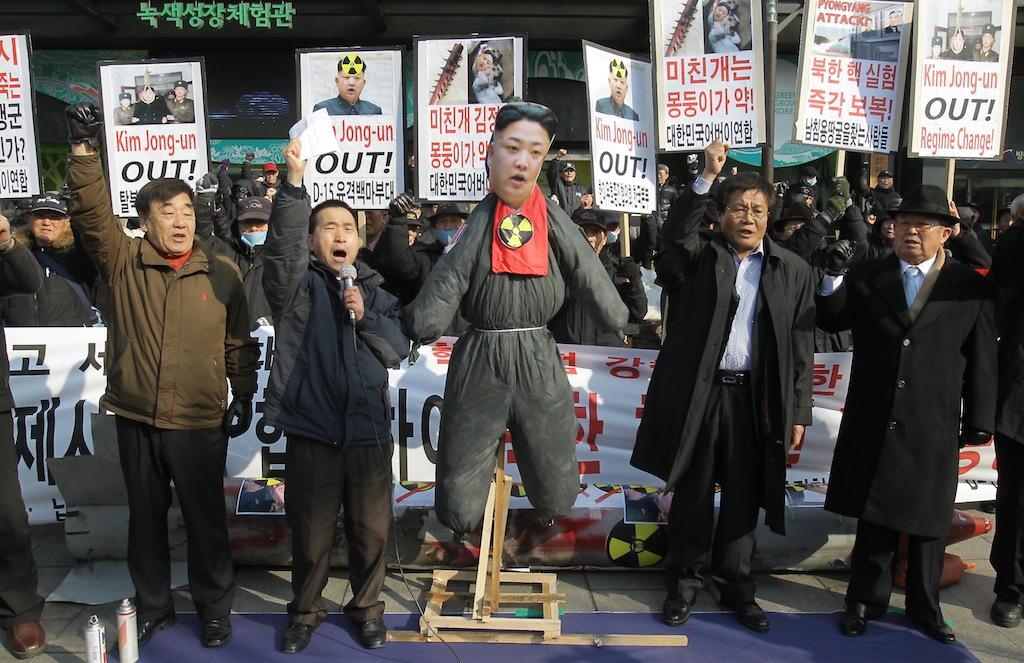North Korea celebrates nuclear test, world condemns it (VIDEO)
A day after North Korea announced a third nuclear test, South Korean’s protest in a rally on Feb. 13, 2013 in Seoul, South Korea.
North Korea's underground nuclear bomb test on Tuesday drew strong international condemnation, including criticism from its only major ally, China.
North Korea’s international shortwave radio broadcaster, the Voice of Korea, announced in poor reception news of the nuclear test in English:
“Nuclear test was successfully conducted in the…DPRK at the northern underground nuclear test ground on Feb. 12, …2013. The nuclear test was conducted…to defend the security and sovereignty of the country to cope with the… hostile acts of United States."
The UN Security Council called the explosion a "clear threat to international peace and security." President Obama said North Korea had “increasingly isolated and impoverished its people through its ill-advised pursuit of weapons of mass destruction."
Foreign Minister Yang Jiechi said China was "strongly dissatisfied and resolutely opposed" to the nuclear test. He urged North Korea to "stop any rhetoric or acts that could worsen situations and return to the right course of dialogue and consultation as soon as possible."
Meanwhile, South Korea bolstered their military preparations and dispatched scientists to investigate the nuclear test, according the Associated Press.
More from GlobalPost: How do you solve a problem like (North) Korea?
China accounts for 70 percent of North Korea's trade, explained Marcus Noland, director of studies at the Peterson Institute for International Economics in Washington DC.
"If China were to decide to impose an economic embargo on North Korea, it would be absolutely crippling to North Korea," Noland told the BBC.
Here's an infographic that maps with Council of Foreign Relations data North Korea's nuclear sites. All three tests are thought to have occurred in Punggye-ri.
North Korea's third nuclear test detonated a bomb estimated to measure several kilotons. The previous two tests in 2006 and 2009 used plutonium, but it's unclear what nuclear material was used on Tuesday. The Washington Post explains why if uranium was used that's bad news:
1. North Korea would have two ways to build a bomb, which means a potentially larger arsenal.
2. The country has a natural supply of uranium and can enrich to bomb-making levels in secret; plutonium is limited and is much tougher to hide. So its weaponized uranium would be tougher to keep track of and easier to make in larger quantities.
3. Iran uses uranium in its nuclear program, so North Korea could share research and lessons from the nuclear test with Tehran.
4. Uranium is easier to ship abroad, meaning North Korea could more easily sell it.
Here's a video of a North Korean state broadcaster joyfully proclaiming the third successful nuclear test. (See below for English translation via the BBC.)
"News report of Korea central news agency: We have successfully carried out the third underground nuclear test.
"The scientific field for national defense of the DPRK succeeded in the third underground nuclear test at the site for the underground nuclear test in the northern part of the DPRK on Tuesday.
"The test was carried out as part of practical measures of counteraction to defend the country’s security and serenity in the face of the ferocious hostile acts of the US, which wontedly violated the DPRK’s legitimate right to launch a satellite for peaceful purposes.
"The test was conduced in a safe and perfect way on a high level with the use of a smaller and lighter A-bomb, unlike the previous ones, yet with great explosive power.
"It was confirmed that the test did not give any adverse effect to the surrounding ecological environment. The specific features of the function and the explosive power of the A-bomb and all other measurements fully tallied with the values of the design, physically demonstrating the good performance of the DPRK’s nuclear deterrence that has become diversified.
"The nuclear test will greatly encourage the army and people of the DPRK in their efforts to build a thriving nation with the same spirit and mettle as displayed in conquering space and offering an important occasion in insuring peace and stability in the Korean Peninsula and the region."
Every day, reporters and producers at The World are hard at work bringing you human-centered news from across the globe. But we can’t do it without you. We need your support to ensure we can continue this work for another year.
Make a gift today, and you’ll help us unlock a matching gift of $67,000!
